
The Altes Museum is a listed building on the Museum Island in the historic centre of Berlin, Germany. Built between 1825 and 1830 by order of King Frederick William III of Prussia according to plans by Karl Friedrich Schinkel, it is considered a major work of German Neoclassical architecture. It is surrounded by the Berlin Cathedral to the east, the Berlin Palace to the south and the Zeughaus to the west. Currently, the Altes Museum houses the Antikensammlung and parts of the Münzkabinett. As part of the Museum Island complex, the Altes Museum was listed as a UNESCO World Heritage Site in 1999, in recognition of its testimony to the development of the museum as a social and architectural phenomenon.
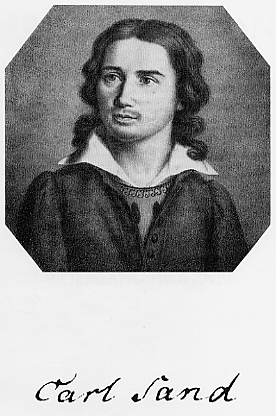
Karl Ludwig Sand was a German university student and member of a liberal Burschenschaft. He was executed in 1820 for the murder of the conservative dramatist August von Kotzebue the previous year in Mannheim. As a result of his execution, Sand became a martyr in the eyes of many German nationalists seeking the creation of a united German national state.

Friedrich David Gilly was a German architect and the son of the architect David Gilly. His works are influenced by revolutionary architecture (Revolutionsarchitektur). Born in Altdamm, Pomerania,, Gilly was known as a prodigy and the teacher of the young Karl Friedrich Schinkel.

Aryanization was the Nazi term for the seizure of property from Jews and its transfer to non-Jews, and the forced expulsion of Jews from economic life in Nazi Germany, Axis-aligned states, and their occupied territories. It entailed the transfer of Jewish property into "Aryan" or non-Jewish hands.
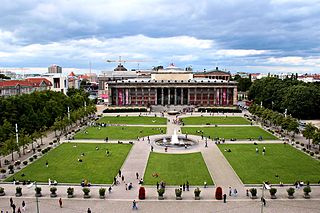
The Lustgarten is a park in Museum Island in central Berlin at the foreground of the Altes Museum. It is next to the Berliner Dom and near the site of the former Berliner Stadtschloss of which it was originally a part. At various times in its history, the park has been used as a parade ground, a place for mass rallies and a public park.
The Arbeitsrat für Kunst was a union of architects, painters, sculptors and art writers, who were based in Berlin from 1918 to 1921. It developed as a response to the Workers and Soldiers councils and was dedicated to bringing current developments and tendencies in architecture and art to a broader population.
Eckhard Jesse is a German political scientist. Born in Wurzen, Saxony, he held the chair for "political systems and political institutions" at the Technical University of Chemnitz from 1993 to 2014. Jesse is one of the best known German political scholars in the field of extremism and terrorism studies. He has also specialized in the study of German political parties and the German political system.
Gerhard Albert Ritter was a German historian.
Aktion Arbeitsscheu Reich was a punitive campaign in Nazi Germany targeting individuals deemed as "work-shy" or "asocial." In April and June 1938, as part of the "Arbeitsscheu Reich"(work-shy Reich), more than 10,000 men were arrested as so-called "black triangle anti-social elements" and sent to concentration camps. During the so-called June-action, about 2,500 Jews who had received previous convictions for varied reasons were also targeted.
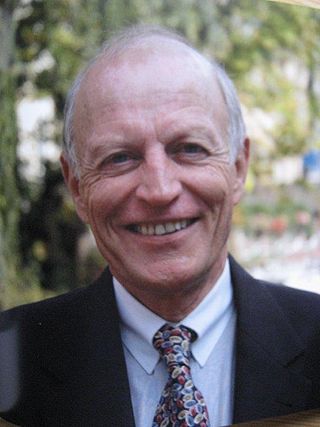
Dieter Mahncke is a scholar of foreign policy and security studies, and Alfried Krupp von Bohlen und Halbach Professor Emeritus of European Foreign Policy and Security Studies at the College of Europe. He is the author of books and articles on European security, arms control, German foreign policy, Berlin, US-European relations and South Africa.
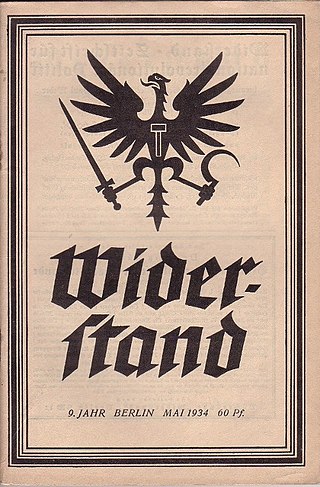
Widerstand. Zeitschrift für nationalrevolutionäre Politik was a monthly magazine established in Germany in 1926 to advocate national-revolutionary idea. It was published in Berlin, under the editorship of Ernst Niekisch. Prominent contributors included Ernst Jünger, Friedrich Georg Jünger, A. Paul Weber, August Winnig, and Joseph E. Drexel. The newspaper was shut down in December 1934. After a time in the underground, Niekisch was arrested and held in Nazi concentration camps from 1937 to 1945.

Dea Loher is a German playwright and author.
Horst Wolfgang Böhme is a German archaeologist with a focus on Late Antiquity / Early Middle Ages and research into castles.

Helmut Müller-Enbergs is a German political scientist who has written extensively on the Stasi and related aspects of the German Democratic Republic's history.
Ilko-Sascha Kowalczuk is a German historian and author. His work is focused on the German Democratic Republic and its Ministry for State Security.
Bettina Baumgärtel is a German art historian who is head of the painting collection of the Museum Kunstpalast in Düsseldorf. She is a leading authority on the art of Angelica Kauffman and founded the Angelika Kauffmann Research Project (AKRP), of which she is the director, in 1990.
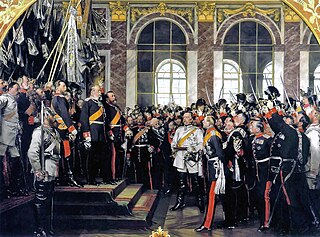
The proclamation of the German Empire, also known as the Deutsche Reichsgründung, took place in January 1871 after the joint victory of the German states in the Franco-Prussian War. As a result of the November Treaties of 1870, the southern German states of Baden, Hesse-Darmstadt, with their territories south of the Main line, Württemberg and Bavaria, joined the Prussian-dominated "North German Confederation" on 1 January 1871. On the same day, the new Constitution of the German Confederation came into force, thereby significantly extending the federal German lands to the newly created German Empire. The Day of the founding of the German Empire, January 18, became a day of celebration, marking when the Prussian King William I was proclaimed German Emperor at the Palace of Versailles.
Wilhelm Emil Mühlmann was a German ethnologist who served as Professor of Ethnology at the University of Mainz and Chair of Ethnology at the University of Heidelberg.
The Codex Hersfeldensis was a manuscript from the Early Middle Ages. Written between 830 and 850, the codex was found in Hersfeld Abbey in the first half of the 15th century. The codex was brought to Italy by Enoch of Ascoli in 1455, where it was divided up and copied. The original has since been lost. The Codex Hersfeldensis is considered to be the original source for the surviving manuscripts of the Opera Minora – the shorter works of Tacitus, including the Germania.
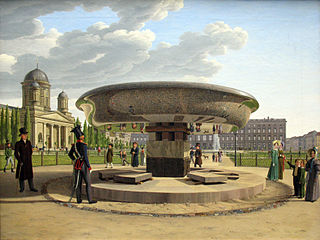
The Great Granite Bowl in Berlin's Lustgarten (German: Granitschale im Lustgarten), which is located in front of the Altes Museum, has a diameter of 6.91 meters and weighs approximately 75 tons. With a circumference of 691⁄7 feet (approximately 21.7 meters), it is considered the Biedermeier Wonder of the World and is the largest bowl carved out of a single stone in existence.










